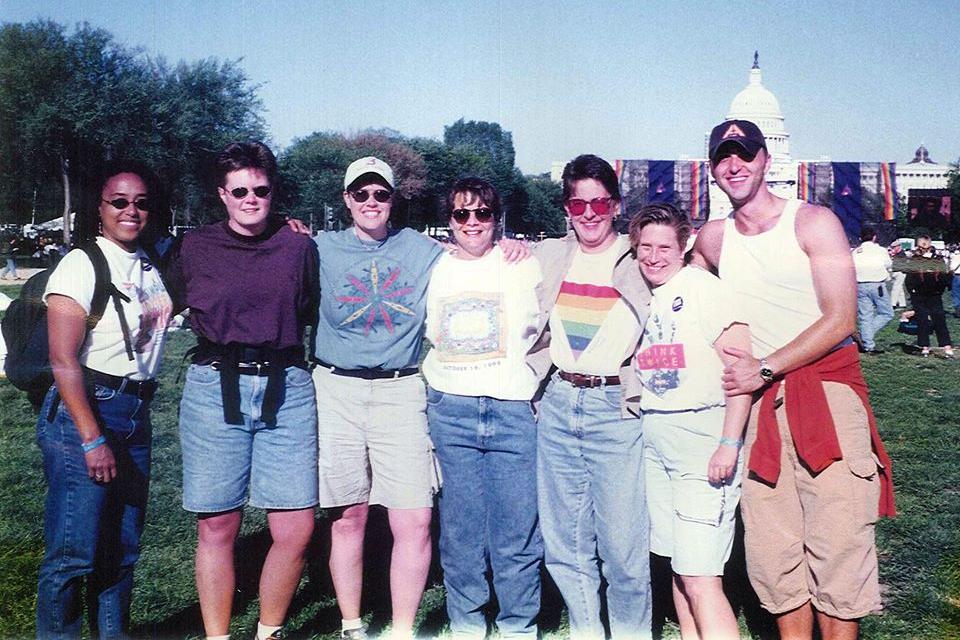Dr. Garcia Reflects on the 50th Anniversary of PRIDE
“PRIDE Club started to make gayness visible on campus. We could be the norm,” said Dr. Garcia. “In the beginning, it was a quiet place to tell personal stories—but it was also very political. It was really a place to bridge across groups, and provide robust discussion around identity and representation. We could be out, we could question things, and we could teach others how to be an ally to others.”
June marks the 50th anniversary of annual Pride celebrations in the U.S., held in remembrance of the Stonewall Uprising. Starting on June 28, 1969, members of the New York City LGBT+ community rose against unjust police attacks against the Stonewall Inn, a popular gay club in the Greenwich Village area. The initial uprising was followed by six days of rioting, which became a galvanizing moment for the American Gay Liberation Movement. One year later, thousands of individuals marched in support of the LGBT+ community, marking the first Pride parade in American history.
Since the first Pride event in 1970, the face of LGBT+ Pride and activism has evolved over time. The Arcadia community has evolved too, reflects Dr. Garcia, noting how Arcadia’s LGBT+ community engaged in many of the national LGBT+ political events, such as holding a candlelight vigil for Matthew Shepard, whose murder in 1998 brought to light the impact of homophobic hate crimes around the nation, coordinating Take Back the Night events to stand against sexual violence, and attending Pride parades as representatives of the University. In April 2000, members of Beaver College’s PRIDE club, along with additional students, staff, and faculty took buses to Washington D.C. to attend the Millennium March on Washington for Equality.
Dr. Garcia, who has taught at Arcadia for over 23 years, aims to bring LGBT+ history and lived experiences into her classes, including teaching courses such as “Gays and Lesbians in American Society,” “Feminist Theory,” and “Sex in Society.” After previously serving as advisor of PRIDE Club for ten years, she remains engaged in LGBT+ discourse within her scholarship.

Dr. Garcia (center) with Professor Emerita of Psychology Dr. Angela Gillem (far left) and Professor of Education Dr. Christina Ager (second from right) at the Millennium March.
Though Pride celebrations today may appear on the surface level as a colorful and joyous party, Dr. Garcia stresses the importance of remembering the origins of Pride and continuing a message of social justice. As an overtone within her courses, Dr. Garcia reminds her students the importance of following words of social justice with meaningful actions, stating “theory without praxis is empty.”
From her perspective, social media and corporate influences have watered down the meaning of Pride into a “sugar pop” form of social justice, which is not substantive to creating real social change. For the future of the Pride movement, it’s increasingly important to Dr. Garcia that there is a balance of celebration and visibility, while also considering who is represented in the Pride movement and having an “intersectional discourse of equity.”
“Flamboyance can be great, because it says to the world ‘you will not tell me how to be,’ but it needs to be followed with discussions,” said Dr. Garcia. “We can do gay pride celebrations, but if we’re not intentionally having a dialogue about the things which scare us, all of the Pride dances in the world won’t make meaningful change.”
Facing your fears and making social change in the face of opposition is difficult, but in Dr. Garcia’s perspective, these issues are more manageable through working as a collective.
“At the marches we attended throughout the years, students witnessed both sides of the fight,” said Dr. Garcia, reflecting on the presence of anti-LGBT+ counterprotesters at the events. “But what was important is that we thought about that stuff together.”


